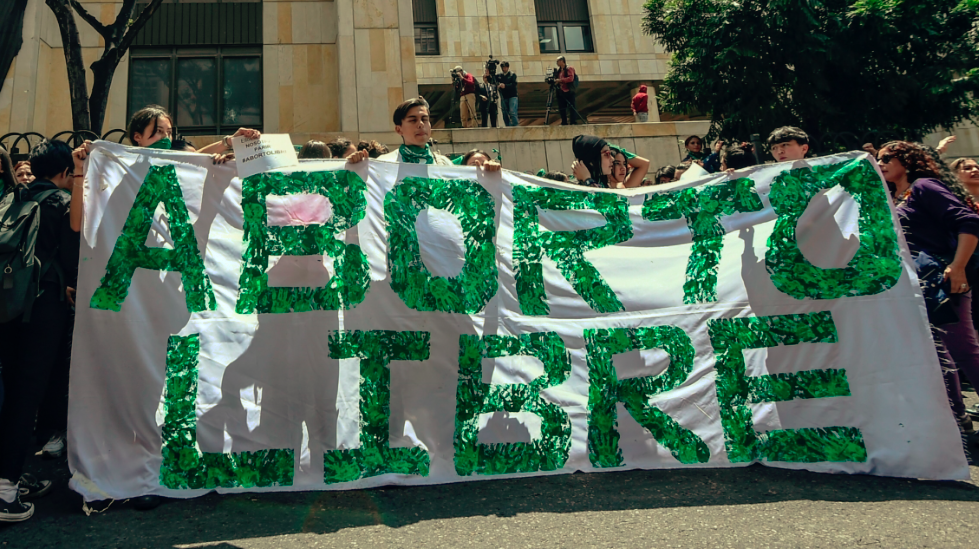RIO DE JANEIRO, BRAZIL – In the coming weeks, the magistrates of Colombia’s Constitutional Court will vote on removing abortion as one of the crimes contemplated in the Penal Code, in an essential debate for women’s sexual and reproductive rights.
The first debate is item 6 of this Wednesday’s agenda, but sources close to the Constitutional Court indicate that it is not known if there will be time to address it. Still, in any case, the Full Chamber has to decide before November 19.
Read also: Check out our coverage on Colombia
WHAT IS THE CURRENT SITUATION?
Abortion in Colombia has been permitted since 2006 -also by a resolution of the Constitutional Court- only on three grounds: when the health or life of the mother is at risk; when pregnancy is the result of rape or incest; or if there is a defect of the fetus.

In all other cases, according to Article 122 of the Colombian Penal Code, women (or those who perform abortions on them) face up to 54 months in prison.
An estimated 400,000 women and girls undergo an induced abortion in Colombia each year. Approximately one-third of them suffer some complications; furthermore, unsafe abortion is the fourth leading Cause of maternal mortality.
To judge the constitutionality of abortion, there are currently two petitions before the Court, which must be studied. They will be presented by the magistrate Alberto Rojas and the president of the Constitutional Court himself, Antonio José Lizarazo, both very similar but with nuances. The two will be analyzed simultaneously, according to court sources.
WHAT WILL BE DEBATED?
Judge Rojas will argue that the crime of abortion “creates an odious and unjustified discrimination” by punishing women who abort, a situation that does not occur with men, according to Efe.
Thus, abortion would be a “gender crime”, so the magistrate intends that it disappears from the Penal Code and that Congress is the one who regulates the voluntary termination of pregnancy and its deadlines.
If this argument does not work, he will try to resort to the “decay of res judicata”, that is to say, that “there is a resignification on sexual and reproductive rights” that merits a new judicial pronouncement; in other words, that the times have evolved and it is no longer necessary only three grounds to guarantee the rights of women.
There were six arguments in the lawsuit filed by the Just Cause for Abortion coalition, formed by feminist organizations, and which Lizarazo has to expose.
“Several arguments have to do with the fact that regulating abortion through the Penal Code hinders its access through the grounds”, explains Efe, the lawyer Marina Ardila, from Women’s Link, one of the organizations behind the Cause.
In other words, it will be based on the barriers to access to abortion in the three grounds and that it also “violates equality because the structural barriers disproportionately affect women and girls in vulnerable situations,” such as those living in rural areas.
In this way, research documenting that “the crime of abortion is ineffective because it does not prevent women from having abortions, but encourages them to do so in unsafe conditions” is presented.
WHAT ARE THE TIME LIMITS?
Sources close to the process assure that, once the debate begins, the discussion will take “15 or 20 days,” during which the magistrates will decide if there are arguments to see the crime of abortion as unconstitutional.
In any case, the lawsuit presented by Lizarazo expires on November 19, so it has to be resolved before that date.
WHAT ARE THE POSSIBILITIES OF DECRIMINALIZATION?
The favorable vote of five of the nine magistrates in any of the two debates is necessary for decriminalization.
A similar debate presented in 2020 that called for decriminalizing abortion without barriers up to the 16th week of gestation was only supported by three magistrates, so it remains to be seen if more followers are obtained now.
It is taken for granted that both Rojas and Lizarazo will vote in favor, and they will be joined by the speaker of the 2020 debate, Justice Alejandro Linares. According to sources consulted, a fourth vote is assured, and it remains to convince one of the female judges.
However, from ‘Causa justa por el aborto’, they feel “excited”. “We feel that we are very close (to achieve decriminalization), in Colombia, we had never been this close,” says Efe, the lawyer of Women’s Link.

